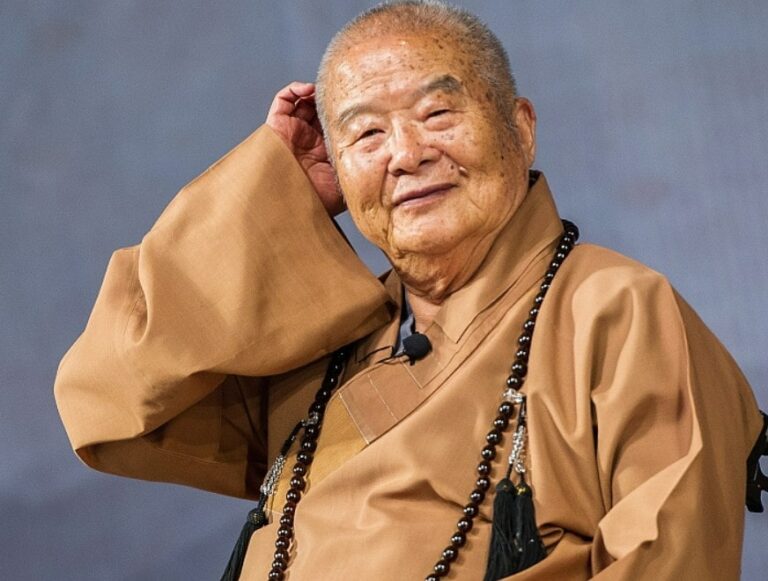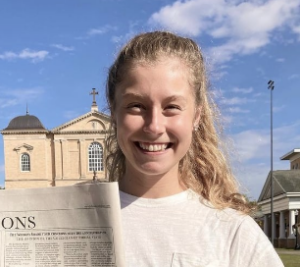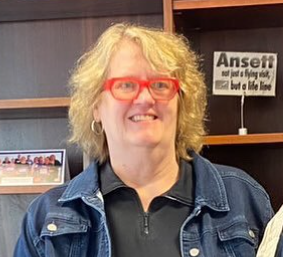One of Taiwan’s most influential and beloved Buddhist monks is being recognized as a man who advocated for international harmony and supported peaceful reunification across the Taiwan Strait.
This honor was bestowed upon him by Taiwan.
On Sunday, Master Hsing Yun passed away without incident at the Fo Guang Shan monastery in Kaohsiung, which he had established. He was 95.
The monastery has stated that there will be no specific Buddhist ceremonies performed for him because he wished to depart this world in a straightforward manner; nonetheless, on February 13, a memorial service will be held at the temple.
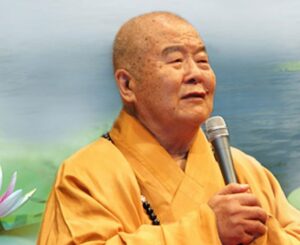
Also Read: Mother With Her 7 Children Died In Fire Accident Due To Broken Clothes Dryer, Know More Details
Table of Contents
Hsing Yun: Who Was He?
Hsing Yun, who was born as Lee Kuo-shen in 1927 to a poor family in China’s Jiangsu Province, became interested in Buddhism at the age of 12 after visiting Nanjing’s Qixia Temple.
At the time, he was on a trip to the city with his mother to look for his father, but they were unsuccessful in their search. Hsing Yun was born as Lee Kuo-shen.
In 1947, upon the taking of his monastic vows, he received his diploma from Jiaoshan Buddhist Seminary.
After waiting another year, he relocated to Taiwan, where he taught Buddhist philosophy and served as the editor-in-chief of the Buddhist magazine Humanity Magazine.
Hsing Yun established Fo Guang Shan as a monastery in Kaohsiung in 1967 with the intention of advancing “the ideals of humanistic Buddhism and fostering peace and harmony among all peoples of the globe.”
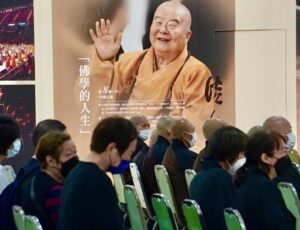
Fo Guang Shan made slow but steady inroads into the fields of education, charity, and the media. Additionally, it established over three hundred temples all over the world, in addition to Buddhist seminaries, libraries, and publishing firms.
Hsing Yun began establishing educational institutions all over the world beginning in 1991, starting with Fo Guang University and Nanhua University in Taiwan, the University of the West in the United States, Nan Tien Institute in Australia, and Guang Ming College in the Philippines.
As a component of the Fo Guang Shan University Consortium, the five schools’ respective cross-enrollment and exchange programs have been running continuously from the year 2015.
Hsing Yun has become increasingly involved in China over the past few decades. He has provided funding for the construction of temples and libraries, directed educational and cultural programs, and encouraged cross-strait interactions. Hsing Yun has also run educational and cultural initiatives in Taiwan.
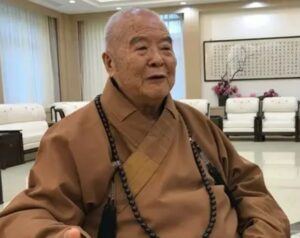
Hsing Yun Died At The Age Of 95
A key role in the Humanistic Buddhism movement, famous Buddhist monk and teacher Venerable Hsing Yun passed away in Taiwan.
He was the founding patriarch of the Fo Guang Shan Buddhist order and the Buddha’s Light International Association in Taiwan. The official news of his departure states that Ven. Hsing Yun passed away on Sunday at five o’clock in the afternoon local time.
According to the news which is affiliated with the Fo Guang Shan Order, a formal announcement was made on Monday morning at 5am by Ven.
Hsin Bau, chairperson of the Fo Guang Shan Board of Directors, as a thousand monastic and lay members of the Fo Guang Shan Order knelt in the main shrine courtyard of the Fo Guang Shan Monastery.
Hsing Yun: Death Cause Explored!
He founded the Fo Guang Shan monastery in 1967 with the intention of disseminating the Buddhist ideals of compassion for all living beings.
He oversees the operation of numerous temples and seminaries in more than one hundred locations across the globe, and he also established a large number of universities in Taiwan, Australia, the United States of America, and the Philippines under his own name.
When he was just 12 years old, he went to a well-known temple in Nanjing, the capital of the province capital, and it was there that he developed a deep interest in Buddhism.
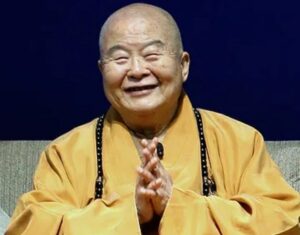
As the atheist Communist Party surged across the mainland in 1949, he fled to Taiwan and settled there. Regarding his personal details, there is not a great deal of information that can be found.
There have been many people expressing their condolences for his passing; yet, there has been no information published or announced in relation to the circumstances surrounding his funeral or obituary.
His friends, neighbors, and loved ones are mourning his loss and expressing their affection for him. His death may have been caused by his extended old age, but no one from his family, friends, or loved ones has said anything about the cause of his passing at this time.
Keep up with socialtelecast.com to read other articles on the most recent and other news subjects from around the world.
Also Read: Murder Update: How Did Ron Nelson Died? Death Cause & Obituary- Peanuts Office
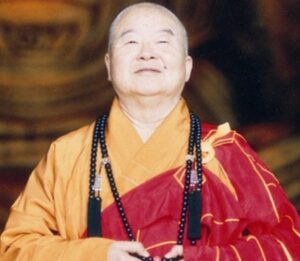
Hsing Yun Politics Career Details
- People who advocated for Taiwan’s independence and religious figures criticized Hsing Yun’s views for being overtly political and “considerably far afield from traditional monastic concerns.”
- Hsing Yun was well-known in Taiwan for his involvement in political affairs, particularly as a supporter of the One-China policy and government legislation supported by the Kuomintang.
- Hsing Yun was also known for his support of government legislation supported by the Kuomintang.
- Hsing Yun voiced their support for Ma Ying-jeou, a candidate for the Kuomintang party, during the presidential election in 2008.
- Hsing Yun made these statements in 2009 during the second World Buddhist Forum. He said that there are “no Taiwanese” and that those living on Taiwan “are Chinese.”
- In 2012, he stated that China was the rightful owner of the Senkaku Islands, which are also referred to as the Diaoyutai Islands.
- During the campaign for president in 2016, Hsing Yun drew a lot of attention to himself when he made a comparison between Tsai Ing-wen and the Chinese goddess Mazu.
- He went on to say that Tsai’s similarities to Mazu would definitely help her win the election for president, which she achieved in the end.
- Hsing Yun extended his public backing to the KMT candidate Hung Hsiu-chu, who subsequently withdrew from the campaign, in order to put an end to speculations that he was switching political parties.
- Despite the fact that Hsing Yun was a member of the Kuomintang, he was well known to be revered by politicians affiliated with both parties.
- As a result, he was paid a visit by each president of the ROC, with the exception of Chiang Kai-shek.
- He worked hard to prevent rifts from developing between him, his organization, and the Chinese government, despite the fact that he actively promoted peace negotiations between China and the Dalai Lama.
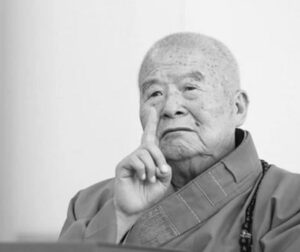
Hsing Yun: Childhood And Family
1927 saw the birth of Master Hsing Yun. He was born into a family with the surname Li in the Chinese province of Jiangsu. He was given the name Li Kuo-shen at birth.
He had an older brother, an older sister, and an older brother who were his immediate siblings. He was the third of four children.
After leaving the house to pursue business opportunities, his father was never seen or heard from again. In the midst of his mother’s frantic quest for her husband, who was also a devoted Buddhist, he traveled to Nanjing.
He had no idea that he would run into the host monastic at Chi-Hsia Shan Monastery, but he did. When the senior monk who was hosting young Li asked him if he had any interest in becoming a monk, the younger monk responded with an emphatic “yes.”
In a quarter of an hour, the abbot of the monastery, Master Zhi Kai, requested that Li could be tonsured under him; consequently, Master Zhi Kai would be Li’s master. Li agreed to this request.
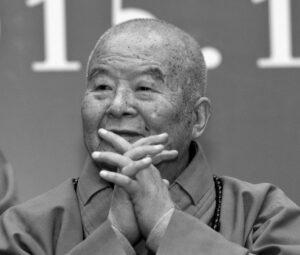
As a result, young Li got his head shaved when he was 12 years old. His ordination took place while he was known by the dharma names Jin Chueh and Wu Che.
Hsing Yun received his full ordination in the year 1941 and continued his monastic education at Ch’i-Hsia Vinaya School until 1945, when he moved on to Chiao-Shan Buddhist College to complete his studies.
He made a solemn promise at a young age to reestablish and advance Buddhism throughout the world. In 1949, he fled his birthplace in mainland China to make his way to Taiwan, which was at the time in the midst of a civil war.
He hadn’t seen his mother since they’d been separated for half a century when they were finally reunited in 1979; throughout those final years of her life, he spent the majority of his time taking care of her.
She went suddenly in 1995 at the age of 90 at the Hsi Lai Temple, a month after the Venerable Hsin Ping, Hsing Yun’s apparent heir apparent, passed away.
Hsing Yun: Achievements
Hsing Yun began achieving a great deal for his age beginning in the 1950s and continuing through today.
He was responsible for the creation of a large number of schools for children, the recording of the first Buddhist hymns, and his promotion to executive positions within a variety of Buddhist organizations.
Hsing Yun created a Buddhist cultural center in 1957, and the center is responsible for the publication of a wide range of Buddhist books in addition to educational tools such as audio and visual aids.
In the year 1959, Hsing Yun was a supporter of the Tibetan campaign against communist repression, and he also staged the first float parade in commemoration of the festival of Wesak in Taiwan.
It is possible that one of Hsing Yun’s biggest accomplishments was his successful campaign to make Wesak a national holiday in Taiwan. This wish was granted by former ROC President Lee Teng-hui in the year 2000, and it was Hsing Yun’s goal all along.
Read More: Victoria Lee Death Cause: How Did The ONE MMA Fighter Died? She Was Just 18
